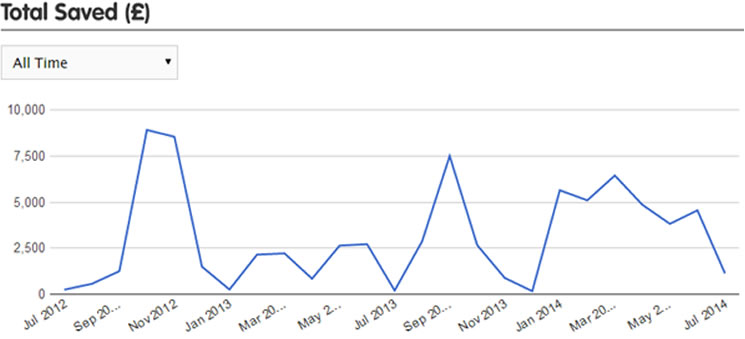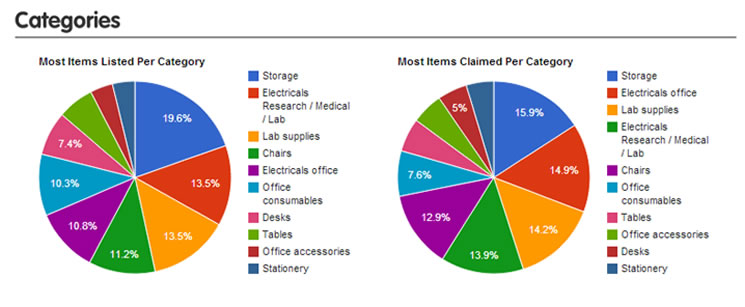Alex Green from the Sustainability Team at UCL created this awesome video
- Very large University
- Savings in excess of £100K in 2 years
- 26 tonnes supply chain CO2 avoided
- High proportion of trades are lab equipment
- Sharing between universities and 3rd sector.
- 30 minutes per month management time
Paul Monk is the Waste Manger at University College London (UCL) , a very large institution with a global pedigree and huge student and staff body. UCL started using Warp it in the autumn of 2012 after setting up an internal message board to reuse items.

Avoided procurement and waste savings at UCL
Appetite for Reuse
There was an existing message board system at UCL which is a good start. Paul said
We were seeing loads of items getting thrown in the skip that were perfectly usable, whilst at the same time seemed to be spending a fortune on expensive furniture. We also had a message board style reuse system which just didn’t work, so there was the frustration involved in knowing that there was an appetite for reusing items but it wasn’t fulfilled.
Discussing how Warp it was rolled out and encouraged Paul said.
Warp it is open to all staff and is a voluntary programme, the way the university is run makes it impossible to make it compulsory. Warp it was initially used as a tool from a waste disposal perspective, to try to drive waste reduction but recently it’s been pushed as a purchasing tool and our procurement department are heavily promoting the system. It’s also a focus of our Ecocampus and Green Impact programmes.
Collaborative approach internally and externally
UCL are part of a much wider Warp it network with about 15 very large public sector organisations using the system in London. Paul said:
We are also partnered up with local universities and many items have been exchanged between us.
Paul went on to highlight the collaborative approach to managing the system internally.
I lead on Warp it but increasing its becoming a collaborative operation with input from Procurement and Environmental Sustainability teams. The beauty of Warp it is that it is quite low maintenance. I mostly have to approve users and once a month I look up the data stats for the purposes of reporting.
Electrical equipment
Paul is particularly happy with how the system has been used for lab kit. He said
Our research lab users heavily use the system. At any given month around just over 50% of all items exchanged are lab related. It has caught on because they see the benefit of Warp it directly in savings from their grant funds. If they can save money by getting a free piece of equipment then that’s money they can spend on something else, more kit, extra researchers even. Likewise if they can donate a piece of equipment they avoid disposal charges giving them another direct grant saving.

Pie charts showing categories traded at UCL
Building clearances and decants
When discussing building clearances and decants Paul has some great feedback
Our Project teams seem keen to reuse items instead of disposing of them, but less keen on using reused items in new fit outs. I’ve not really had any success in trying to get Projects to include Warp it as part of their project plan, and when they have there’s been very little time to implement it and reusable items have gone to waste instead. The Warp it system is not great when it comes to bulk uploads either.
This is something we are working on with 3 new ways to bulk upload items. Watch this space!
Awards
UCL has won an S-Labs award for the use of the reuse portal to redistribute unwanted lab resources throughout the university. More here.
Benefits
When summarising the benefits Paul says
From an Estates department point of view we get to report on waste reduction, savings and carbon savings. The users get old items they no longer need taken away and the other users get items they need for free. Everyone wins. The ease of use and most importantly the opportunities it opens up for collaboration with other organisations are great features.
The future of reuse
Looking into the crystal ball Paul says about the future,
I’m hoping that it will be the norm to reuse items many times. I’d also like to think that sharing equipment and resources will be factored into purchasing decisions. It would also be great if we moved away from the disposable culture we have now to one where equipment is easier and cheaper to repair.